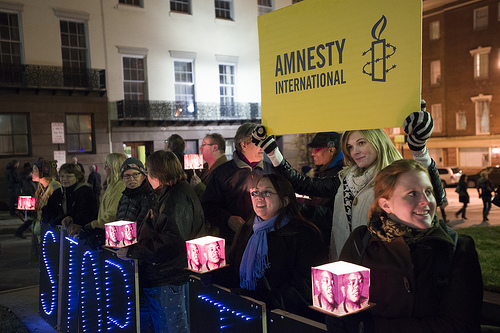Activist Spotlight: Pye Jakobsson On the Amnesty International Vote and Holding Allies Accountable

As the vote this weekend at the Amnesty International General Council Meeting in Dublin approaches on whether the human rights organization will adopt a draft proposal supporting the decriminalization of prostitution as policy, I spoke, via e-mail, to Global Network of Sex Work Projects (NSWP) President Pye Jakobsson on NSWP’s petition to Amnesty urging them to vote in favor of it. Jakobsson is also the co-founder of Rose Alliance, Sweden’s sex workers’ rights organization, so she has key insight into the Swedish model of criminalizing sex workers’ clients championed by the the Coalition Against Trafficking in Women, the prohibitionist organization behind the petition asking Amnesty to vote against the proposal for decriminalization.
Can you comment on the notorious petition by the Coalition Against Trafficking in Women urging Amnesty International members to vote against the decriminalization proposal when it’s submitted at the organization’s International Council Meeting in Dublin this weekend? It’s been signed by a gaggle of celebrities—Kate Winslet, Lena Dunham, Anne Hathaway, and Emma Thompson among them—and it received a lot of attention in the news last week. Why do you think so many in Hollywood are drawn to anti-sex worker anti-trafficking activism?
I find the whole thing revolting. actually. Right, so I get holding babies is getting kind of old, and animal rights is too mainstream to gain any real attention, so now they are hugging trafficking victims.
There are just so many problems with that, though:
1) Grown up women are neither children nor puppies.
2) People who are being exploited in the sex industry need rights, not hugs.
3) Just because you once played a hooker doesn’t give you any extra special insights [in]to what sex workers and/or people who experience exploitation in the sex industry need.
How can we fight back against that sort of star power to make our case in the court of public opinion?
I really want to answer [with] some fancy, clever version of “we have truth on our side,” but so far that hasn’t been enough.
Last weekend, me and a long-time activist looked at each other and said “Shit, we need to scramble up some celebrities.” Truth is, there are not many of those around. The actor Rupert Everett that supports ECP (English Collective of Prostitutes) is one. Rose Alliance has our own little celebrity if one is into kitsch European disco from the 80s, in our member (and yes, former sex worker) Alexander Bard. If you’ve never heard of his iconic group Army of Lovers, I dare you to look them up. But that’s it.
I am not really sure we want to go after celebrities unless they have actually worked as sex workers. I prefer sticking to sex workers themselves as the experts. I do think that it is time to hold all our so-called allies accountable. You say you are on our side? Now would be a really good time to prove it. This last week several people within the UNAIDS family, Amnesty, and other big organizations have been risking their own jobs trying to do what’s right. Now, that is commitment.
It is easy saying you are an ally because you feel all fluffy inside [on the] IAC (International AIDS Conference) when you walk around with a badge saying “Save us from saviours,” but what about the rest of the year? I know I am not very flexible on this—ask our allies in Sweden. We really don’t let them fuck around. There is no time for pretty words while people are dying.
I really think we need to demand more of our allies. It is time for some old school hardcore activism—either you are with us or you are against us. And no, owning a red umbrella does not count. We need our research spread, our petitions signed and more doors opened. We need to be included in decision making processes at all levels, and those who claim to be our allies should facilitate that. I got allergic to…buzz words of sympathy without any action or commitment the […] second [Swedish sex worker] Jasmine got murdered, and I haven’t changed since.


